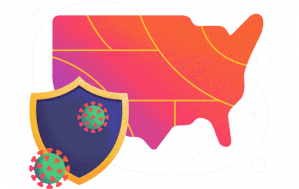With only 5% of the population fully vaccinated against COVID-19 as of February 17, and vaccination being an essential component for full reopening of the economy, WalletHub today released its report on the Safest States During COVID-19, along with accompanying videos and audio files.
In order to find out the safest states during the COVID-19 pandemic, WalletHub compared the 50 states and the District of Columbia across five key metrics. Our data set includes the rates of COVID-19 transmission, positive testing, hospitalizations and death, as well as the share of the eligible population getting vaccinated. Below, you can see highlights from the report, along with a WalletHub Q&A.
Hawaii’s Safety During Coronavirus (1=Best; 25=Avg.):
- 25th – Vaccination Rate
- 1st – Positive Testing Rate
- 1st – Hospitalization Rate
- 2nd – Death Rate
- 8th – Transmission Rate
Note: Rankings are based on data available as of 12:30 p.m. ET on Wednesday, February 17, 2021.
To view the full report and your state’s rank, please visit:
https://wallethub.com/edu/safest-states-during-covid/86567

WalletHub Q&A
How will recent severe-weather shutdowns across the country impact COVID-19 vaccinations?
“The recent severe-weather shutdowns across the country will slow the pace of vaccination and prevent some people from getting a second dose as early as they should. Not only will the storms force distribution centers to close and postpone people’s appointments, but they will also cause ‘widespread’ delays in new vaccine shipments, according to the CDC,” said Jill Gonzalez, WalletHub analyst. “Once the severe weather has cleared, the government should try to increase the volume of shipments to make up the lost ground. The more efficiently we can distribute the vaccine, the sooner the country can return to normality.”
Why is a state’s level of safety so important for its economy?
“The level of safety in a state is crucial to its economy because it determines the way businesses are allowed to operate. States will not remove their current COVID-19 restrictions until certain safety benchmarks are met, such as the reduction of the transmission rate to specific levels. Until it is safe enough to remove these restrictions, business will continue to be stunted across the U.S.,” said Jill Gonzalez, WalletHub analyst. “The best way to help state economies is to get most people in each state vaccinated, which in turn will create a much safer environment and allow businesses to operate at normal capacity and hire in full force.”
What actions can residents take in order to increase the safety of their community and their state?
“The most important thing that residents can do to increase the safety of their community and state is to get vaccinated when they are eligible. While the vaccines being offered have a high efficacy, how well they are able to curb the pandemic also depends on the share of the population that chooses to get vaccinated,” said Jill Gonzalez, WalletHub analyst. “Until we achieve widespread vaccination and get the pandemic under control, people should continue to wear masks in public and practice social distancing to achieve the highest level of safety possible.”
Is there a correlation between a state's vaccination rate and its death rate?
“At the moment, we have found a weak positive correlation between the vaccination rate ranking and the death rate ranking. In other words, as the vaccination rate increases, the death rate decreases,” said Jill Gonzalez, WalletHub analyst. “It’s important to consider the fact that vaccination has been slow so far, and only small portions of the population are eligible. In the future, we should expect a stronger correlation between the two variables as the vaccination rate increases.”
Does Ohio, the state with the highest death rate, lag behind in vaccination?
“In addition to having the highest death rate in the nation in the past week, at nearly 400 per million, Ohio also ranks as the 17th lowest when it comes to the share of the population age 16 and over who have received at least the first dose of the vaccine,” said Jill Gonzalez, WalletHub analyst. “Increasing the number of people vaccinated is essential for getting control of the pandemic.”
The above Q&A is also provided in audio format and can be edited as needed.